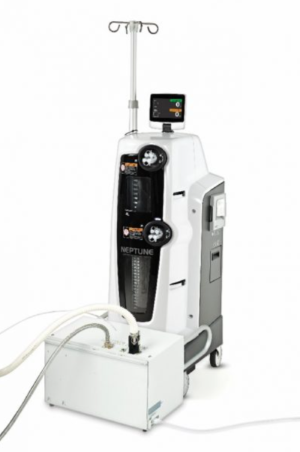Neptune 3 Waste Management System

Impact:
In 2021, Stryker’s Neptune 3 won the award for the industry waste category from the Sustainability Partnership by the NHS, UK.
In most operating rooms today, fluid surgical waste is typically collected in disposable plastic suction canisters. A standard process for disposing of surgical fluid waste commonly involves manually opening the canisters, emptying contents into a drain or adding chemical solidifiers, depositing it into waste bags, and transporting it to landfill or incineration. All of these touch points pose potential exposure risks, including:
– Splashing onto face, eyes or skin
– Fluid spills on the floor
– Exposure while adding isolysers or transporting
By sealing off suctioned biohazards – from initial collection, through disposal and internal self-cleaning – the Neptune 3 Waste Management System can convert these physical interactions into a touch of a button.
Using Neptune 3 can also contribute to saving fuel and transportation costs as well as CO2 emissions, since the fluid waste is automatically flushed through the docking station.
Other sustainable benefits include:
– 94 % less fluid waste weight transported to incineration/landfill (1)
– Neptune reduces the materials needed for cleaning (2)
Below are a selection of Neptune customer testimonials that demonstrate how Neptune has had a positive environmental impact on the hospitals.
1. “Neptune has a huge part to play in reducing the amount of fluid waste and plastics incinerated.
When used in Urology Operating Rooms, Neptune replaces an average of 4 x 60 litre clinical waste bins filled with 3 x 3 litre gel sacks in each bin per case. With 4 cases per list this equates to 16 bins a day that must be transported off site for incineration. With the Neptune system, this is reduced to 4 small plastic filters per list, which can be recycled” 1 – Theatre Manager (Neptune customer)
2. “Neptune has also fulfilled part of the trust’s Green Plan, formerly the Sustainable Development Management Plan, which is a requirement under the NHS Standards Contract.
Overall this system has assisted in promoting and maintaining a safe working environment for our staff, patients, and in turn has increased theatre efficiencies” 2 – Hospital environmental and sustainability lead (Neptune customer)
The opinions expressed herein are the opinions of HCPs and not necessarily those of Stryker. Individual experiences may vary.
References:
1. Barker, K., & Robinson, H. “Green Theatre Project”. SEA-G Newsletter, Scottish Environmental Anaesthesia Group,UK. (2021).
2. Bell, S. “Waste management system improves carbon footprint”. Talking Point Spring. South Tees Hospital NHS Trust, UK. (2021)
Where:
We have over 100 Neptune 3 waste management systems in operating rooms in the Nordics. If you would like to know more, please contact us.

Stryker
- More about Neptune 3's benefits and GREEN StudyContact:
Nina Schellekens, Associate Brand Manager
Telephone: +32 470 78 00 11
Email: nina.schellekens@stryker.com